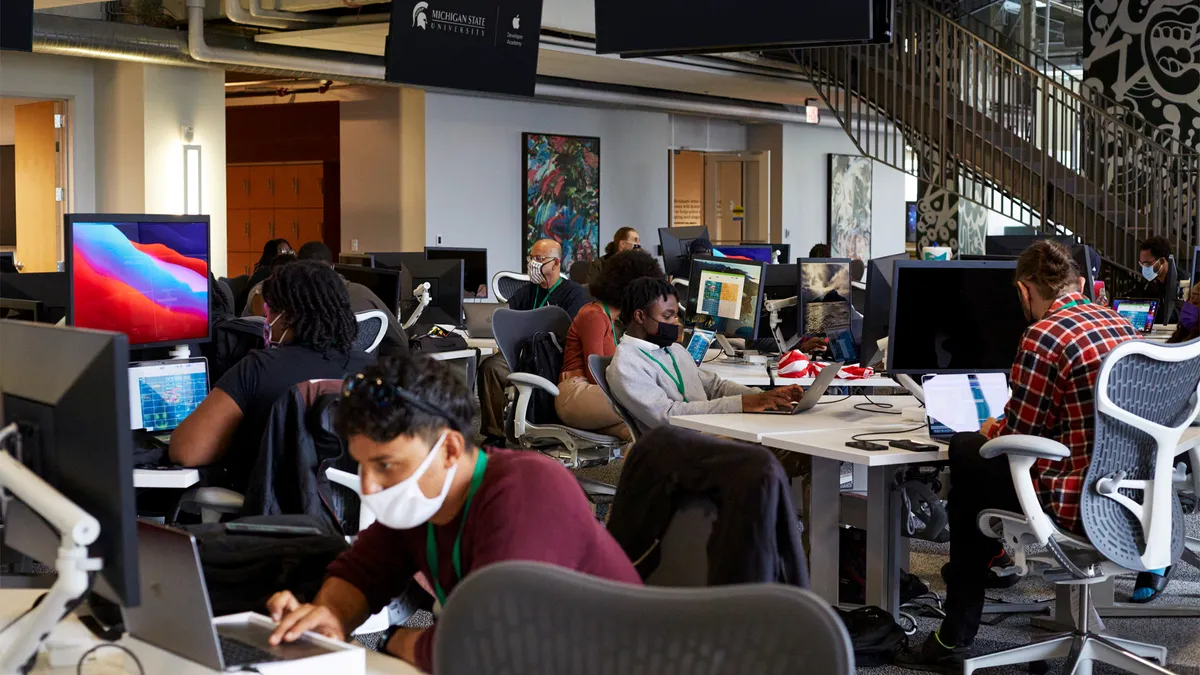Imagine trying to hire staff for an industry that didn’t exist even a year ago — to train on compliance not yet finalized. Imagine an industry experiencing such rapid growth that there’s an excellent chance the employee you just spent a small fortune hiring and training will be poached from your payroll before she hits her first anniversary. Business in emerging and fast-growing industries face these challenges daily.
States and localities continue to legalize cannabis for medicinal and recreational use, for example. Stores open, but no one has yet tested the guidelines given (if they are given at all) for growing product, verifying medical forms or advising the public on use and dosage. A craft brew has become a hit and the garage business has become a cottage industry. Suddenly, legal compliance, OSHA regulations, safe food handling practices and more are priorities.
With limitless threats, cyber-security staff is in such high demand that schools and bootcamps can’t churn them out fast enough. Even if a company is lucky enough to find someone qualified to meet the challenges of today, will they have the chops for the incursions of the future? How can business meet their training needs for industries in flux?
As new businesses find their footing in a brave new world, older industry employers can take a few hints from their younger counterparts to find ways to stay in compliance and make training interesting.
Find guidance where you can
For new industries, like cannabis growth and sales, there may be few options. Look to the government agency that legalized the industry for help, including requirements for grow houses, budtenders, etc. Training programs are emerging as the industry grows, some at local colleges, others provided by trainers that travel the country. Finding the resources necessary to build a business that is in compliance is key.
Craft brewery certifications are taking local colleges by storm, where a wealth of classes, either in person or online, are becoming available. Look to local government agencies for assistance as well, on compliance and OSHA issues that may apply.
For even more help, it pays to network. Look to associations and trade organizations for access to learning, recommendations and even advocacy. As new industries continue to pop up, typically so do associations — something older employers could remember, as well.
For more specific training, look online for content you can use or adapt. Brewery safety, budtender training and more is out there, with titles added almost every day. The challenges newer employers face are likely not new; someone has likely already resolved them and, hopefully, shared their learning materials.
Rapid growth industries
Cyber-security may be one of the fastest growing market sectors in IT, but the imbalance between supply and demand is causing many industry leaders angst. Training workers in cybersecurity rules is a top priority for many execs, especially as hiring externally becomes more difficult (if not impossible).
D2L Co-founder and Chief Strategy Officer Jeremy Auger emailed HR Dive about his own experience as a startup: "I can tell you from experience — when it was just five people, employee training was something that happened over beers and take-out." But once you start growing, he says, you need to quickly nail down how you’re going to bring people into the organization, get them productive as quickly as possible, and do it in a way that preserves your innovative, nimble start-up culture.
You can’t always get what you want
An employer may not be able to find a qualified budtender when the city just legalized cannabis, but it still needs staff. Start by staffing individuals with key soft skills, such as customer service and a curiosity to learn, and build from there.
Skills are needed, but drive is a must. Christen Snodgrass, co-owner of Iron&Glass Taproom and Bottleshop, and her husband Colt used their experiences in a variety of industries to get them started, she revealed to HR Dive in an email interview. Colt’s passion for craft beer propelled them into their venture; the rest is hard work.
"Colt spends hours looking at articles and researching beer releases, trends, breweries, and business questions that arise," she said. “He is now very knowledgeable about Illinois liquor laws and our rights as an LLC.” Passion and a drive to learn can pave the path to success.
Skills that translate
Can’t find an exact fit? Auger recommended changing your expectations; rather than trying to hire for a specific role, look for competencies that can be built upon. Hiring for competencies has two important elements, he said.
“First, you have to have a reliable system to evaluate competencies — what do your employees already know how to do? Second, you need to be able to address any gaps between the competencies employees have and the ones you need.” He suggested having a robust learning and development program in place.
Some skills translate across all categories and can be the building blocks of growth. Dr. Kevin Gumienny, senior learning architect for Microassist, told HR Dive in an email that “soft skills” like business processes, interpersonal skills, and leadership techniques are needed regardless of how new or rapidly evolving an industry is. He recommended businesses leverage available technology to upskill staffers, but you don’t have to wait for others to create content.
"The ability to record video and audio using common technology like smartphones allows subject matter experts to create content anywhere," he said, "and educational technology services exist that allow for the just-recorded training to be uploaded and shared with employees." Microlearning, he explains in a post, can create learning for small and limited topics.
Prepare to be poached
Prepare to have your newly trained employee poached. In a tight applicant market, a contract to recover training costs in the event they leave before you’ve earned your return on their education could be advisable, but such contracts remain risky. An employer should consult an attorney if considering a contract that requires an employee to stay on payroll for a pre-determined amount of time following completion of the training to hedge any bets.
Whether you’re blazing trails in a brand new industry, or trying to stay above water in an industry experiencing rapid growth, Auger reminded employers of the need for continuous learning to succeed and stay competitive.
“It will soon become just as strategically important for all companies to become learning companies — offering continual opportunities for their employees to evolve their skills," he said.





















